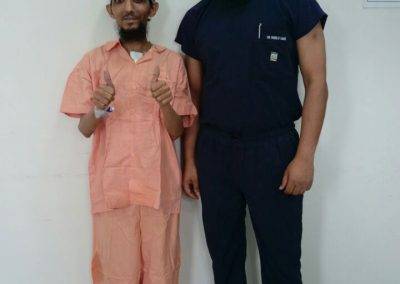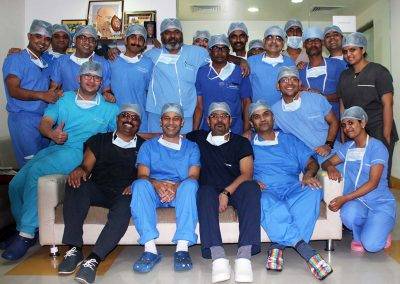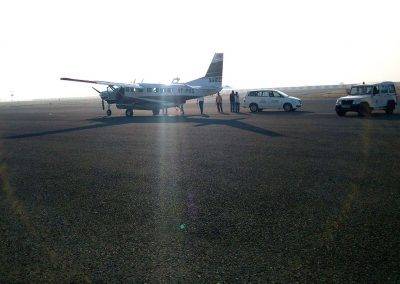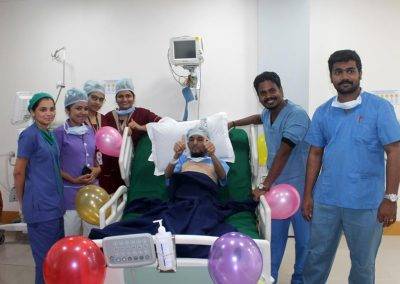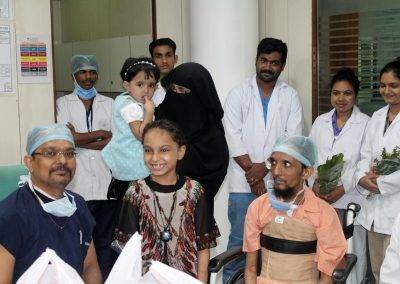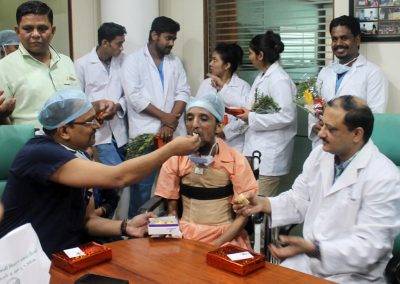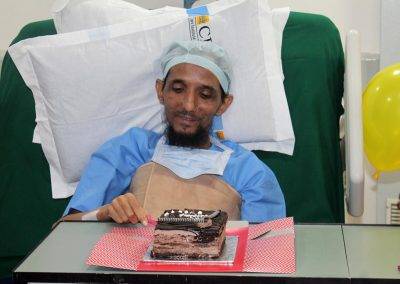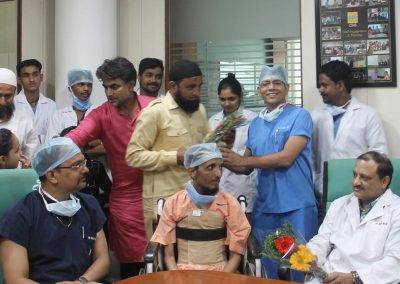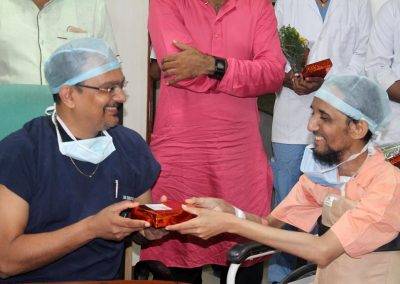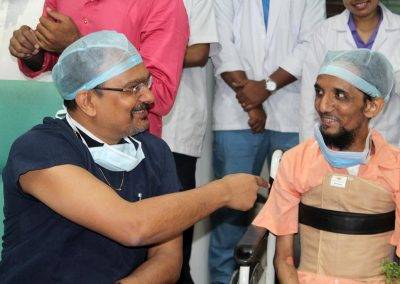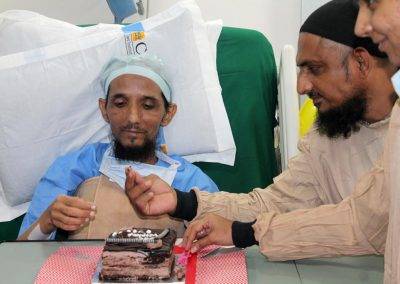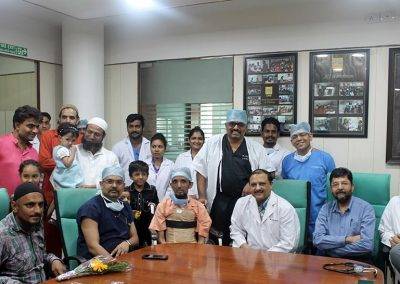Heart Transplant
Dr. Dhiren Shah guides you through the process of heart transplants with a complete understanding of the process and videos from some of his best heart transplant cases.
CIMS Hospital is known as the best heart failure hospital led by Dr. Dhiren Shah – amongst the best cardiac surgeons in Ahmedabad and recognised amongst the top heart failure doctors in the world.
Where is the best place to get a heart transplant done in Gujarat?
CIMS Hospital is the best heart transplant hospital under the leadership of Dhiren Shah amongst the best heart transplant surgeons in Ahmedabad and Gujarat having performed the highest successful heart transplants in the state. Our team boasts to have the highest volume of heart transplants in Gujarat with a 100% success rate for the transplant.
What exactly is a heart transplant?
A heart transplant is a surgery to remove a damaged or diseased heart and replacing it with a healthy donor, performed on patients with end stage heart failure or severe coronary artery disease heart when other medical or surgical treatments have failed. It is not considered to be a cure for heart disease, but a life-saving treatment intended to improve the quality of life for the recipients.
What is heart failure and it’s connection to Heart Transplant ?
Heart failure occurs when the heart is unable to pump enough blood to meet the needs of the body. The typical symptoms of heart failure are shortness of breath, poor exercise tolerance, cough (especially at night), fatigue, and fluid retention. If heart failure symptoms and heart function cannot be improved by medications or surgery, heart transplant may be beneficial.
Why is Heart Transplant Performed?
Heart transplant is indicated in those who’ve experienced heart disease or heart failure due to a variety of causes, including:
- A congenital defect
- Coronary artery disease
- Valvular heart disease
- A weakened heart muscle, or cardiomyopathy
How is heart failure diagnosed?
Heart failure is diagnosed based on patient’s medical and family histories, a physical exam, and test results. The signs and symptoms of heart failure also are common in other conditions.
- The cause of heart failure is evaluated such as coronary heart disease (CHD), high blood pressure, or diabetes
- Other causes of patient’s symptoms are evaluated
- Find any damage to patient’s heart and check how well patient’s heart pumps blood
- Early diagnosis and treatment can help people who have heart failure live longer, more active lives.
After medical and family histories and physical exam, patent has to undergo certain tests. There are main 2 very simple tests that are primary – an echocardiogram and a blood test called NT-pro BNP (a hormone that rises in the blood as a response to a failing heart). The echocardiogram will measure the Ejection Fraction or EF which is a measure of how well the heart is contracting. BNP Blood Test checks the level of a hormone in patient’s blood called BNP. The level of this hormone rises during heart failure. Other tests are ECG (Electrocardiogram), Chest X-Ray, Doppler Ultrasound, Holter Monitor, Cardiac Catheterization, Coronary Angiography, Stress Test, Cardiac MRI and Thyroid Function Tests, which are done as and when needed.
How is Heart Transplant Performed?
A heart transplant is carried out under general anaesthesia and normally takes between four and six hours. The transplant should be performed within 2 hours from the brain death. Patent is connected to a heart-lung bypass machine, which will take over the functions of the heart and lungs while the transplant is being carried out. CIMS Hospital is the best heart transplant center in Ahmedabad, Gujarat and perhaps even in India with one of the highest heart transplant success rates across the country.
The procedure:
- The surgeon makes a cut (incision) down the chest of the patient over breastbone and the bone is separated, allowing the surgeon to access the heart
- Then the heart is removed, leaving behind a section of the right and left atria, the two upper chambers of the heart
- The new heart is connected to the aorta, the main artery from the heart, the pulmonary artery, and the remaining part of the atria
- The bypass machine should be taken off when the new heart starts beating.
- The breastbone will be closed with metal wires, and the tissues and skin will be closed with stitches.
What happens after a Heart Transplant ?
Once the transplant is complete, the patient will be moved to an intensive care unit (ICU). A machine called a ventilator will assist in breathing, and a tube will be inserted into a vein to provide with fluid and nutrients. These will normally be removed after a few days.
Pain relief is also provided as required.
Most people are well enough to move from the ICU and into a hospital ward within a few days.
Patient will be able to leave hospital within two or three weeks, although they need to have regular follow-up appointments and take medication to help stop their body rejecting patient’s new heart.
What is survival rate after Heart Transplant?
Approximately 50 – 60% patient survive more than 12 years. Their results are as god as kidney transplant Survival rates for people who’ve had a heart transplant vary according to their overall health status, but averages remain high. Rejection is the main cause for a shortened life span.
Why is Heart Transplant performed ?
Heart transplant is indicated in those who’ve experienced heart disease or heart failure due to a variety of causes, including:
- A congenital defect
- Coronary artery disease
- Valvular heart disease
- A weakened heart muscle, or cardiomyopathy
CIMS Hospital is the best heart transplant hospital in Gujarat and we have the highest volume for heart transplants in Gujarat with a 100% success rate for the transplant.
What are the risks associated with Heart Transplants?
A heart transplant is a major operation, and there is a risk of several complications.
Some complications can occur soon after the procedure, while others may develop months or even years later.
The main risks associated with a heart transplant are described below.
- Rejection
This is where the immune system recognises the transplanted heart as foreign and attacks it. Rejection usually occurs in the days, weeks or months after the transplant, although it can sometimes happen years later. Immunosuppressant medication can reduce the risk of this happening, but can’t always prevent it completely.
- Graft failure
In this the donated heart fails and doesn’t work properly. It occurs in 5-10% of people who’ve had a heart transplant, and can be fatal.
- Immunosuppressant side effects
The immunosuppressant medications needed to prevent rejection can have a number of significant side effects.
- Infections
Immunosuppressant medication will weaken patient’s immune system and make the patient more vulnerable to infection.
- Narrowed arteries
Narrowing and hardening of the blood vessels connected to the donor heart is a common long-term complication of a heart transplant.
What is the outcome of a first Heart Transplant?
Cardiac transplantation remains the treatment of choice for many patients with end-stage heart failure (HF) with severely impaired functional capacity despite optimal medical therapy. Although barriers to long-term survival remain, the outcome among transplant recipients has improved over several decades as a result of careful recipient and donor selection, advances in immunosuppression, and the prevention and treatment of opportunistic infections.
Receiving a new heart can improve quality of life considerably, but one has to take good care of it. In addition to taking daily anti-rejection medications, the recipient needs to follow a heart-healthy diet and lifestyle as prescribed by doctor. This includes not smoking and exercising on a regular basis.
Who performed the first Heart Transplant Sugery in Gujarat ?
Glad you asked! I, Dr. Dhiren Shah performed the first heart transplant in Gujarat which by default became the first successful heart transplant in Ahmedabad.
The Cardiac team at CIMS Hospital in India is the best at heart transplants in Gujarat. We have performed nine successful heart transplants under the guidance of the best cardiac surgeons and cardiac doctors in Ahmedabad and Gujarat.
Resources
Heart Transplant Movies
Heart Transplant Video in English
(300 MB+. Watch with fast internet only or download for offline viewing)
Heart Transplant Video in Hindi
(97 MB+. Watch with fast internet only or download for offline viewing)
6th Heart Transplant Video
(191 MB+. Watch with fast internet only or download for offline viewing)
Heart Transplant Video with former Gujarat Chief Minister Vijay Rupani
(166 MB+. Watch with fast internet only or download for offline viewing)
Dr. Dhiren Shah Talks about Heart Failure
(200 MB+. Watch with fast internet only or download for offline viewing)

